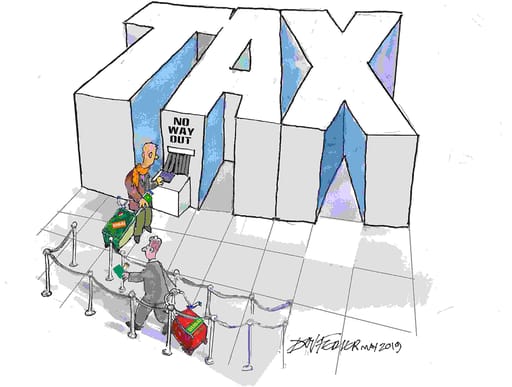Receive Focus insights straight to your inbox
It’s not often that a tax amendment makes headlines and raises as much controversial debate as it has with the imminent changes to how foreign employment income of South African tax residents will be taxed from 1 March 2020.
Potentially affected South African tax residents will find a plethora of views in the media, some correct, and others somewhat misguided and naïve when it comes to the correct application of the law. However, with time running out, it’s crucial that correct decisions are made relating to #TAX2020 (the trending hashtag), based on each person’s particular circumstances.
This article sets out the various aspects to consider, from both a tax and exchange control perspective.
Also read: Tax: it's about getting the basics right

Sign up to the Focus newsletter for regular insights from Investec experts.

Current law applicable to South African residents working abroad
In order to understand the changes with effect from 1 March 2020, it’s important to recap on the existing legislation. Under current tax law (applicable up to 28 February 2020), South African tax residents working abroad are entitled to a tax exemption from income earned abroad, provided that they’re physically outside of South Africa for 183 days in aggregate during any 12-month period and, during that 183-day period outside South Africa, at least 60 days must be continuously spent outside SA.
Where both these requirements are met, South African tax residents can claim a tax exemption from the income that relates to employment services rendered outside of SA. The concept of employment is important, as the current and impending law only applies where the foreign remuneration is earned within an employment context, irrespective of whether the employment relationship is with a South African or foreign employer – this means that an individual who is in an independent contractor relationship cannot take advantage of the applicable tax exemption.
It’s important to note that the affected South African taxpayer must still declare the foreign-sourced income in a South African tax return and claim the relevant tax exemption – because South African tax residents must declare all their income on a worldwide basis, even though some of that income may be exempt from tax in SA. Too often, individuals earning foreign income just exclude the income from their tax return or completely neglect to submit tax returns at all, which is an incorrect application of the law.
New tax law applicable from 1 March 2020
Effective from 1 March 2020, only the first R1million earned from foreign service income will be exempt from tax in South Africa, provided that more than 183 days are spent outside SA in any 12-month period and, during the 183-day period, 60 days are continuously spent outside SA.
This practically means that any foreign service income above the first R1million will be taxed in South Africa at the relevant tax resident’s marginal tax rate. The hypothetical example below explains how this works:
An individual who is a South African tax resident is employed in Kenya and earns the equivalent of R1.5million per year. This individual did not spend any time in South Africa during the 2021 year of assessment.
Result: The individual will be subject to tax in Kenya under its domestic law on a monthly basis, on the full income earned. The individual would also be required to declare the R1.5million earned in Kenya on his or her South African tax return for the 2021 year of assessment (i.e. 1 March 2020 to 28 February 2021).
However, in a departure from previous tax years, only the first R1million will be exempt from income tax in South Africa. This means that the R500,000 (i.e the amount over R1million) will also be subject to tax in South Africa, but the individual will be able to claim a tax credit in South Africa for taxes already paid in Kenya on that income portion, in order to avoid double taxation.
Mitigating the impact of #TAX2020
This is where the controversy starts: how does an affected individual mitigate the impact of #TAX2020? The starting point is to understand, based on a person’s particular circumstances, what their exact tax residency status is. A person will be a ‘resident’ for tax purposes in South Africa, where that person is either ordinarily resident or physically present over a set number of days within a five-year period unless a relevant double tax agreement regards the person to be exclusively a resident of another jurisdiction.
The impending changes only apply to a person who is a South African tax ‘resident’ working abroad and earning foreign income. Where tax residency is ceased before 1 March 2020, the impending changes will be academic, given that the affected individual will, going forward, only become taxable on income from a South African source or deemed source.
The cessation of residency does, however, trigger an ‘exit charge’ under section 9H of the Income Tax Act 58 of 1962, based on the market value of worldwide assets held at that point, excluding fixed property in South Africa held in a personal capacity. This effectively means a capital gains tax charge at a maximum effective rate of 18%, with the individual not necessarily having the required cash flow to settle the exit charge. Again, depending on specific facts and circumstances, certain individuals may find themselves in a position where tax residency has already ceased, meaning that the affected individual carries an embedded capital gains tax liability which may require an application to SARS under the voluntary disclosure programme in order to regularise historical non-compliance.
How does the new legislation affect you?
S10 (1) (0) (ii) checklist
| Before amendment | After amendment | |
| Who does it apply to | South African tax resident. | South African tax resident. |
| Remuneration | Salary, leave pay, wage, overtime pay, bonus, gratuity, commission, fee, emolument or allowance, including any share vestings. | Salary, leave pay, wage, overtime pay, bonus, gratuity, commission, fee, emolument or allowance, including any share vestings. |
| Employee | Any employee, excluding an independent contractor or self-employed person. | Any employee, excluding an independent contractor or self-employed person. |
| Employer | Resident or non-resident employers. | Resident or non-resident employers. |
| Qualifying period | During any 12 month period | During any 12 month period |
| Outside South Africa | Beyond the territorial waters (that is 12 nautical miles) for any person rendering employment services; which may include— • any officer or crew member employed on a ship engaged in prospecting, exploration, mining or production of or for minerals but not employed for the navigation of the ship or for the exploration or exploitation of natural resources; or • any officer or crew member employed on a South African ship mainly engaged in fishing but not employed for the exploitation of natural resources. | Beyond the territorial waters (that is 12 nautical miles) for any person rendering employment services; which may include— • any officer or crew member employed on a ship engaged in prospecting, exploration, mining or production of or for minerals but not employed for the navigation of the ship or for the exploration or exploitation of natural resources; or • any officer or crew member employed on a South African ship mainly engaged in fishing but not employed for the exploitation of natural resources. |
| Days required | For – • a period or periods exceeding 183 full days in aggregate during any period of 12 months; and • for a continuous period exceeding 60 full days during that period of 12 months. | For – • a period or periods exceeding 183 full days in aggregate during any period of 12 months; and • for a continuous period exceeding 60 full days during that period of 12 months. |
| Apportionment required? | Yes, to the extent that services are rendered outside the Republic. | Yes, to the extent that services are rendered outside the Republic. |
| Income exempt | All remuneration earned while working outside the Republic | First R1 000 000 remuneration earned while working outside the Republic |
| Will emigration stop the section applying to you? | No | No |
| How do you stop the section from applying to you? | Tax emigration | Tax emigration |
Source: Income Tax Act 58 of 1962, Investec Tax & Fiduciary
Exchange control implications
Up to this point, we haven’t mentioned exchange control residency as it relates to #TAX2020. The reason is that the impending changes can only be mitigated by way of cessation of South African tax residency and not through formal financial emigration i.e. emigration for exchange control purposes.
Where tax residency is based on the concepts of being either ‘ordinarily resident’ or ‘physically present’ in South Africa, unless a tax treaty determines otherwise, exchange control residency is based on the concepts of ‘domicile’, ‘citizenship’ or ‘permanent residence’ status in South Africa. Where a person financially emigrates from South Africa for exchange control purposes and obtains the right to reside in another jurisdiction, it doesn’t necessarily mean that tax residency has ceased as well.
Financial emigration has its place and will suit certain people, but it will not alleviate their tax burden when it comes to foreign earned income, come 1 March 2020. In particular, a person who’s uncertain about residing permanently outside South Africa should think hard about whether to financially emigrate, as any emigrant returning to South Africa within a five-year period will be regarded as a ‘failed emigration’, which could result in repatriation of assets back to South Africa. The permanency of your exit from SA is therefore crucial when it comes to tax and exchange control.
Although financial emigration involves an element of tax compliance in terms of obtaining a relevant clearance certificate, it’s not a determining factor that would alleviate the impending tax burden on foreign earned income, post 1 March 2020.
Affected individuals should take professional advice from their tax advisors.
Investec Tax & Fiduciary helps Investec clients, that meet the discretionary minimum investment requirements, to navigate the complexities of local and international wealth structuring.
Trust us to manage your wealth today




